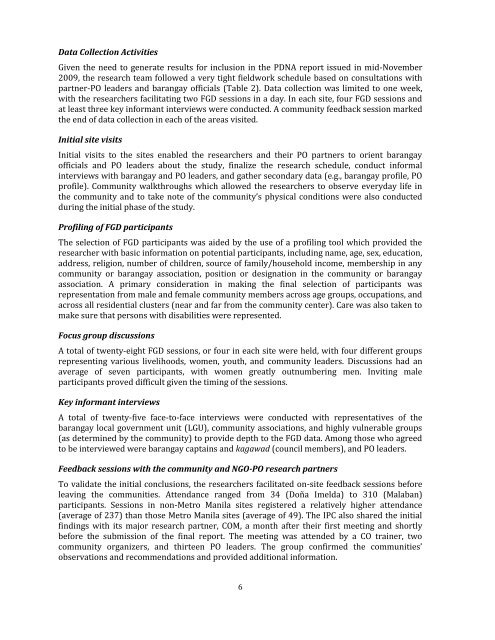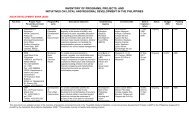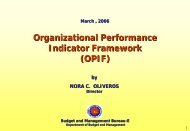rapid assessment of the social impacts of - Philippines Development ...
rapid assessment of the social impacts of - Philippines Development ...
rapid assessment of the social impacts of - Philippines Development ...
Create successful ePaper yourself
Turn your PDF publications into a flip-book with our unique Google optimized e-Paper software.
Data Collection Activities<br />
Given <strong>the</strong> need to generate results for inclusion in <strong>the</strong> PDNA report issued in mid-November<br />
2009, <strong>the</strong> research team followed a very tight fieldwork schedule based on consultations with<br />
partner-PO leaders and barangay <strong>of</strong>ficials (Table 2). Data collection was limited to one week,<br />
with <strong>the</strong> researchers facilitating two FGD sessions in a day. In each site, four FGD sessions and<br />
at least three key informant interviews were conducted. A community feedback session marked<br />
<strong>the</strong> end <strong>of</strong> data collection in each <strong>of</strong> <strong>the</strong> areas visited.<br />
Initial site visits<br />
Initial visits to <strong>the</strong> sites enabled <strong>the</strong> researchers and <strong>the</strong>ir PO partners to orient barangay<br />
<strong>of</strong>ficials and PO leaders about <strong>the</strong> study, finalize <strong>the</strong> research schedule, conduct informal<br />
interviews with barangay and PO leaders, and ga<strong>the</strong>r secondary data (e.g., barangay pr<strong>of</strong>ile, PO<br />
pr<strong>of</strong>ile). Community walkthroughs which allowed <strong>the</strong> researchers to observe everyday life in<br />
<strong>the</strong> community and to take note <strong>of</strong> <strong>the</strong> community’s physical conditions were also conducted<br />
during <strong>the</strong> initial phase <strong>of</strong> <strong>the</strong> study.<br />
Pr<strong>of</strong>iling <strong>of</strong> FGD participants<br />
The selection <strong>of</strong> FGD participants was aided by <strong>the</strong> use <strong>of</strong> a pr<strong>of</strong>iling tool which provided <strong>the</strong><br />
researcher with basic information on potential participants, including name, age, sex, education,<br />
address, religion, number <strong>of</strong> children, source <strong>of</strong> family/household income, membership in any<br />
community or barangay association, position or designation in <strong>the</strong> community or barangay<br />
association. A primary consideration in making <strong>the</strong> final selection <strong>of</strong> participants was<br />
representation from male and female community members across age groups, occupations, and<br />
across all residential clusters (near and far from <strong>the</strong> community center). Care was also taken to<br />
make sure that persons with disabilities were represented.<br />
Focus group discussions<br />
A total <strong>of</strong> twenty-eight FGD sessions, or four in each site were held, with four different groups<br />
representing various livelihoods, women, youth, and community leaders. Discussions had an<br />
average <strong>of</strong> seven participants, with women greatly outnumbering men. Inviting male<br />
participants proved difficult given <strong>the</strong> timing <strong>of</strong> <strong>the</strong> sessions.<br />
Key informant interviews<br />
A total <strong>of</strong> twenty-five face-to-face interviews were conducted with representatives <strong>of</strong> <strong>the</strong><br />
barangay local government unit (LGU), community associations, and highly vulnerable groups<br />
(as determined by <strong>the</strong> community) to provide depth to <strong>the</strong> FGD data. Among those who agreed<br />
to be interviewed were barangay captains and kagawad (council members), and PO leaders.<br />
Feedback sessions with <strong>the</strong> community and NGO-PO research partners<br />
To validate <strong>the</strong> initial conclusions, <strong>the</strong> researchers facilitated on-site feedback sessions before<br />
leaving <strong>the</strong> communities. Attendance ranged from 34 (Doña Imelda) to 310 (Malaban)<br />
participants. Sessions in non-Metro Manila sites registered a relatively higher attendance<br />
(average <strong>of</strong> 237) than those Metro Manila sites (average <strong>of</strong> 49). The IPC also shared <strong>the</strong> initial<br />
findings with its major research partner, COM, a month after <strong>the</strong>ir first meeting and shortly<br />
before <strong>the</strong> submission <strong>of</strong> <strong>the</strong> final report. The meeting was attended by a CO trainer, two<br />
community organizers, and thirteen PO leaders. The group confirmed <strong>the</strong> communities’<br />
observations and recommendations and provided additional information.<br />
6




